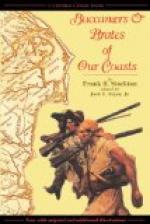After the discoveries of Columbus, the Spanish mind seems to have been filled with the idea that the whole undiscovered world, wherever it might be, belonged to Spain, and that no other nation had any right whatever to discover anything on the other side of the Atlantic, or to make any use whatever of lands which had been discovered. In fact, the natives of the new countries, and the inhabitants of all old countries except her own, were considered by Spain as possessing no rights whatever. If the natives refused to pay tribute, or to spend their days toiling for gold for their masters, or if vessels from England or France touched at one of their settlements for purposes of trade, it was all the same to the Spaniards; a war of attempted extermination was waged alike against the peaceful inhabitants of Hispaniola, now Hayti, and upon the bearded and hardy seamen from Northern Europe. Under this treatment the natives weakened and gradually disappeared; but the buccaneers became more and more numerous and powerful.
The buccaneers were not unlike that class of men known in our western country as cowboys. Young fellows of good families from England and France often determined to embrace a life of adventure, and possibly profit, and sailed out to the West Indies to get gold and hides, and to fight Spaniards. Frequently they dropped their family names and assumed others more suitable to roving freebooters, and, like the bold young fellows who ride over our western plains, driving cattle and shooting Indians, they adopted a style of dress as free and easy, but probably not quite so picturesque, as that of the cowboy. They soon became a very rough set of fellows, in appearance as well as action, endeavoring in every way to let the people of the western world understand that they were absolutely free and independent of the manners and customs, as well as of the laws of their native countries.
So well was this independence understood, that when the buccaneers became strong enough to inflict some serious injury upon the settlements in the West Indies, and the Spanish court remonstrated with Queen Elizabeth on account of what had been done by some of her subjects, she replied that she had nothing to do with these buccaneers, who, although they had been born in England, had ceased for the time to be her subjects, and the Spaniards must defend themselves against them just as if they were an independent nation.
But it is impossible for men who have been brought up in civilized society, and who have been accustomed to obey laws, to rid themselves entirely of all ideas of propriety and morality, as soon as they begin a life of lawlessness. So it happened that many of the buccaneers could not divest themselves of the notions of good behavior to which they had been accustomed from youth. For instance, we are told of a captain of buccaneers, who, landing at a settlement on a Sunday, took his crew to church. As it is not at all




